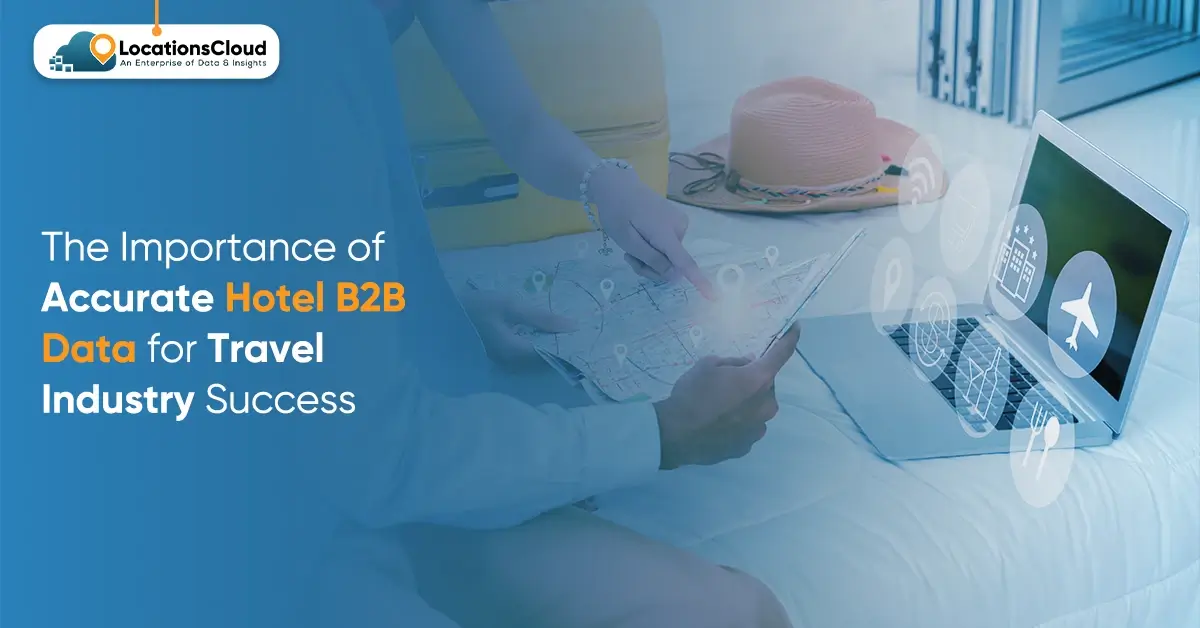
The travel industry operates on data. Every booking, every customer interaction, and every business decision depends on data. However, not all data carries equal value. For travel businesses working in the B2B space, accurate hotel data separates successful operations from struggling ones.
LocationsCloud understands this reality. The company has built its reputation on delivering precise, verified hotel information that travel businesses rely on daily. But why does data accuracy matter so much? Let’s explore how quality hotel B2B data drives success across the travel industry.
What Makes Hotel B2B Data Critical?
Hotel B2B data encompasses all information that travel businesses need to operate effectively. This includes property details, room types, pricing structures, amenities, location coordinates, contact information, and availability data. Travel agencies, tour operators, booking platforms, and corporate travel managers all depend on this information.
Therefore, when this data contains errors or outdated information, the consequences come through entire operations. A wrong phone number means lost booking opportunities. Incorrect room descriptions lead to customer complaints. Outdated pricing causes revenue losses. Meanwhile, accurate data enables smooth operations and satisfied customers.
The Real Cost of Inaccurate Hotel Information
Many travel businesses underestimate how much bad data costs them. The expenses go far beyond immediate financial losses. Let’s examine the true impact.
Lost Revenue and Booking Failures
When your hotel database contains incorrect information, bookings fail. Customers abandon incomplete transactions. Sales teams waste time chasing dead leads. LocationsCloud has documented cases where travel businesses lost 15-20% of potential bookings due to data quality issues.
Consider this scenario: A corporate travel manager searches for hotels near a specific business district. Your system shows properties, but the location data is wrong by several kilometers. The manager books elsewhere because your information doesn’t match their needs. You’ve lost that sale, and you might never know why.
Damaged Customer Relationships
Customer trust takes years to build and seconds to destroy. One bad experience with incorrect hotel information can end a business relationship permanently. When clients arrive at properties that don’t match your descriptions, they blame you, not the data source.
Furthermore, fixing these problems consumes valuable resources. Customer service teams spend hours handling complaints. Account managers work overtime to salvage relationships. Marketing teams struggle to overcome negative reviews. The damage extends far beyond a single transaction.
Operational Inefficiency
Inaccurate data forces teams to manually verify information. Sales representatives call hotels to confirm details. Operations staff cross-reference multiple sources. IT departments field constant complaints about data quality. These inefficiencies drain productivity and increase operational costs.
LocationsCloud clients report that switching to accurate data sources reduced their verification time by 60-70%. Teams redirected those hours toward revenue-generating activities instead of data cleanup.
Key Components of Quality Hotel B2B Data
Not all hotel data providers deliver the same quality. Understanding what separates excellent data from mediocre information helps you make better decisions.
Accuracy and Verification
Accurate data comes from verified sources. LocationsCloud employs multiple verification methods to ensure every data point meets strict quality standards. This includes automated checks, human verification, and regular updates from direct hotel sources.
Additionally, accuracy extends beyond basic contact information. Room descriptions must match actual offerings. Amenity lists should reflect current facilities. Location coordinates need pinpoint precision. Every detail matters because travel businesses stake their reputations on this information.
Completeness and Depth
Comprehensive hotel data includes everything your business needs. Basic information like addresses and phone numbers forms the foundation. However, modern travel businesses require much more.
Detailed property descriptions help sales teams create compelling offers. High-quality images enable marketing teams to showcase properties effectively. Nearby attractions and transportation options help customers make informed decisions. Policy information regarding cancellations, check-in times, and special requirements prevents misunderstandings.
Real-Time Updates and Maintenance
The hotel industry changes constantly. Properties renovate facilities, update amenities, change ownership, and modify policies. Data that was accurate last month might be outdated today.
Therefore, continuous data maintenance proves essential. LocationsCloud updates its database regularly, ensuring clients always access current information. This proactive approach prevents problems before they affect your operations.
Standardization and Consistency
Data standardization ensures smooth system integration. When hotel information follows consistent formats, your technology systems process it efficiently. Booking engines work smoothly. CRM systems update correctly. Analytics tools generate accurate insights.
Moreover, standardized data simplifies training and reduces errors. Team members understand exactly where to find needed information. New employees get up to speed quickly. Everyone works from the same reliable foundation.
How Accurate Data Transforms Travel Business Operations?
Quality hotel B2B data doesn’t just prevent problems. It actively enables growth and competitive advantages. Let’s explore how businesses leverage accurate data for success.
Enhanced Customer Experience
When you provide customers with accurate hotel information, you deliver better experiences. Clients find exactly what they need. Bookings proceed smoothly. Expectations align with reality. Satisfaction scores improve.
Furthermore, detailed data enables personalization. You can match customers with properties that truly fit their preferences. Business travelers find hotels with ideal meeting facilities. Families discover properties with child-friendly amenities. Luxury seekers connect with premium options.
Improved Decision Making
Accurate data powers better business decisions. Management teams analyze trends with confidence. They identify profitable markets, optimize inventory, and allocate resources effectively. Strategic planning becomes data-driven rather than guesswork.
LocationsCloud provides data that supports advanced analytics. Travel businesses use this information to forecast demand, optimize pricing strategies, and identify growth opportunities. The insights gained from quality data create measurable competitive advantages.
Streamlined Operations
Clean, accurate data eliminates operational friction. Booking processes run smoothly. System integrations work reliably. Staff productivity increases because they spend less time fixing problems and more time serving customers.
Additionally, automation becomes possible when you trust your data. You can implement automated booking confirmations, dynamic pricing, and intelligent recommendations. These efficiencies scale your business without proportionally increasing costs.
Stronger Partner Relationships
Hotels appreciate working with travel businesses that maintain accurate information about their properties. When you represent properties correctly, hotels view you as a valuable distribution partner. This strengthens relationships and often leads to better rates and inventory access.
Meanwhile, your business relationships with corporate clients and travel agencies also benefit. They trust your recommendations because your information proves consistently reliable. Trust drives repeat business and referrals.
Selecting the Right Hotel B2B Data Provider
Choosing a data provider significantly impacts your business success. Several factors deserve careful consideration during this decision.
Data Source and Collection Methods
Understand how providers collect and verify their data. LocationsCloud uses multiple collection methods, including direct hotel partnerships, automated web verification, and manual quality checks. This multi-layered approach ensures comprehensive accuracy.
Moreover, providers should clearly explain their data collection processes. Transparency indicates reliability. Hidden methodologies raise red flags about data quality.
Update Frequency and Maintenance
Ask potential providers how often they update their databases. Monthly updates might suffice for some businesses, but others require daily or even real-time updates. Match the update frequency to your business needs.
Furthermore, inquire about their quality assurance processes. How do they identify and correct errors? What happens when hotels report incorrect information? Strong maintenance protocols ensure long-term data quality.
Integration Capabilities
Your hotel data must integrate seamlessly with existing systems. Check whether providers offer APIs, data feeds, or other integration options that match your technical requirements. LocationsCloud supports multiple integration methods to accommodate diverse technology stacks.
Additionally, consider the technical support available. Implementation assistance, documentation quality, and ongoing technical support all affect integration success.
Coverage and Scope
Ensure the provider covers your target markets. Global coverage matters for international travel businesses. Regional specialists might better serve businesses focused on specific markets. LocationsCloud maintains extensive global coverage while offering detailed regional data.
Also, consider whether the provider specializes in specific property types. Some focus on luxury hotels, others on budget accommodations. Match the provider’s strengths to your business focus.
Implementing Quality Data Across Your Organization
Acquiring accurate data is just the first step. Successful implementation requires organizational commitment and strategic planning.
Staff Training and Adoption
Train your teams to leverage the new data effectively. Sales staff should understand how to access and interpret hotel information. Customer service representatives need quick data access to resolve inquiries. Management teams must learn to extract insights from the improved data.
Therefore, invest time in comprehensive training programs. LocationsCloud offers implementation support to help clients maximize their data investment. This support accelerates adoption and ensures teams utilize all available features.
System Integration and Testing
Integrate your new data source carefully. Test thoroughly before full deployment. Verify that booking engines, CRM systems, and other tools process the data correctly. Address any integration issues during testing rather than after launch.
Moreover, establish monitoring processes to catch future problems quickly. Regular data quality checks ensure ongoing accuracy. Automated alerts notify teams when issues arise.
Continuous Improvement
Data quality isn’t a one-time achievement. It requires ongoing attention and refinement. Establish feedback loops where customer service teams report data issues. Create processes for updating information as situations change. Monitor data quality metrics regularly.
Furthermore, stay connected with your data provider. LocationsCloud maintains close relationships with clients, incorporating their feedback into continuous improvement efforts. This partnership approach ensures the data evolves with your business needs.
The Future of Hotel B2B Data
The travel industry continues evolving, and data requirements evolve with it. Understanding emerging trends helps you prepare for future success.
Artificial Intelligence and Automation
AI technologies increasingly depend on quality data. Machine learning models that recommend hotels, predict demand, or optimize pricing all require accurate training data. As LocationsCloud integrates AI capabilities, data accuracy becomes even more critical.
Additionally, automation expands to more areas of travel business operations. Chatbots answer customer questions. Automated systems adjust pricing dynamically. These technologies only work when underlying data is trustworthy.
Enhanced Personalization
Customers expect increasingly personalized experiences. Meeting these expectations requires detailed, accurate hotel data. Beyond basic property information, businesses need data about specific room types, exact amenities, accessibility features, and micro-location details.
Therefore, data providers must expand their offerings. LocationsCloud continuously adds data points that enable better personalization. This commitment to comprehensive data helps clients deliver exceptional customer experiences.
Real-Time Dynamic Updates
The demand for real-time information continues growing. Customers want to know current availability, up-to-the-minute pricing, and live occupancy data. Meeting these expectations requires data infrastructure that updates constantly rather than periodically.
Moreover, real-time data enables dynamic business strategies. You can adjust offers based on current market conditions. You can respond immediately to competitor actions. Speed becomes a competitive advantage.
Making the Move to Better Data
If your current hotel data source causes problems, making a change delivers immediate benefits. However, the transition requires planning and execution.
Assessing Your Current Situation
Start by evaluating your existing data quality. How many customer complaints stem from incorrect information? How much time do teams spend verifying data? What percentage of bookings fail due to data errors? These metrics establish a baseline for measuring improvement.
Furthermore, identify your specific data needs. Which data points matter most to your business? What coverage areas require the strongest focus? Clear requirements guide provider selection.
Comparing Options
Research multiple providers before deciding. LocationsCloud offers consultations to help potential clients understand how accurate data would benefit their specific situations. Compare coverage, accuracy, pricing, and support across providers.
Additionally, request trial periods or data samples. Testing actual data quality before commitment reduces implementation risk. Verify that the provider’s claims match reality.
Planning Your Implementation
Develop a detailed implementation plan. Set realistic timelines. Allocate necessary resources. Communicate changes to all stakeholders. A structured approach ensures smooth transitions and minimizes disruption.
Meanwhile, prepare contingency plans. What happens if integration takes longer than expected? How will you handle the transition period? Thoughtful planning prevents problems.
Conclusion: Data Quality Drives Success
Accurate hotel B2B data forms the foundation of successful travel businesses. It prevents costly errors, enables better customer experiences, streamlines operations, and supports strategic growth. The question isn’t whether to invest in quality data, but rather how quickly you can implement it.
LocationsCloud has built its reputation on delivering the accurate, comprehensive hotel data that travel businesses need. As the industry becomes increasingly competitive and customers grow more demanding, data quality separates industry leaders from those struggling to keep pace.
Success in today’s travel industry requires more than hard work and good intentions. It demands accurate information, efficient operations, and customer-centric strategies. Quality hotel B2B data from LocationsCloud enables all three. The investment pays dividends through increased bookings, satisfied customers, and streamlined operations.
Contact LocationsCloud today to discover how accurate hotel information can transform your travel business. Your competitors are already making this move. Will you lead or follow?



